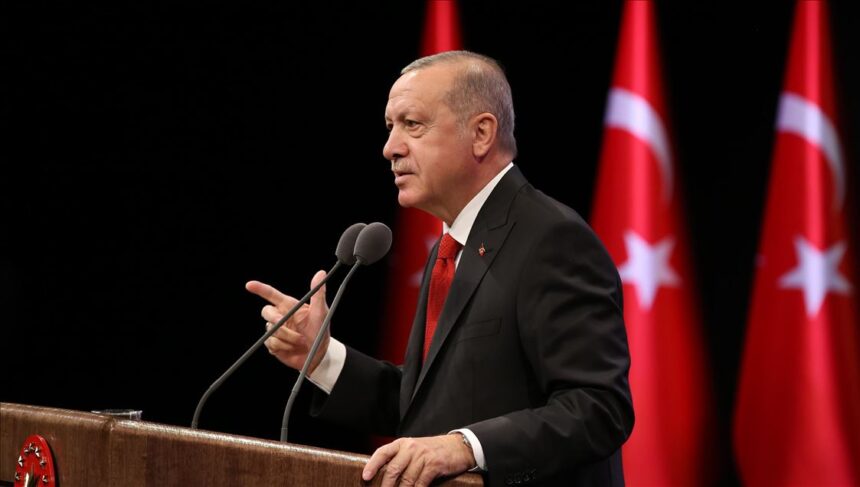By Zeynep Gurcanli
The EU’s discussions about imposing sanctions on Turkey over the Eastern Mediterranean dispute were ‘postponed to March’ with the note: ‘to be coordinated with the U.S.’.
That ‘coordination’ was ensured after Joe Biden took office, which was bad news for Turkey.
After thanking EU leaders for their congratulatory messages, Biden officially launched coordinated efforts between his National Security Advisor, Jake Sullivan, and European Commission President Ursula Von Der Leyen’s Head of Cabinet, Bjoern Seibert.
In addition to the U.S. and the EU’s cooperation, the ‘mutual sources of concern’ were included in the statement issued after the December meeting. And Turkey – along with China – entered the ‘list of concerns.’ The reason why Turkey is an element of mutual concern hasn’t been included in the statement. However, it’s not difficult to guess. Various factors can be the source of ‘concern’, from the violation of human rights to the gradual fraying of an independent judiciary; from AK Party’s purchase of S-400 missiles from Russia to Ankara giving importance to hard power rather than diplomacy.
Interestingly, there was no reaction from the AK Party government to this issue; neither the U.S. or EU ambassadors were invited to the Ministry of Foreign Affairs and no protest was lodged over the fact that an country like Turkey was including alongside China in their joint statement.
Apparently, Ankara has accepted the status of being the West’s ‘source of concern’.
If these ‘concerns’ aren’t alleviated, they will bring ‘counteraction’ that can force Turkey’s hand, at a time when it has reached a gridlock in its in foreign policy and is struggling economically.
The early signs of troubles ahead are emerging. Greece recently increased defense cooperation with the U.S. much more quickly than anticipated and has enlarged the areas of potential conflict with Turkey in the Aegean.
Following the naval base in Crete, the U.S. army was permitted to create a military base in Alexandroupoli, is 30 kilometers from the Turkish border, an area that should be a demilitarized zone, according to the Treaty of Lausanne.
Athens has raised its defense budget 5-fold compared to the previous year, purchasing every available military aircraft, weapon, and ammunition. After signing an agreement to purchase Rafale fighter jets with missiles – from France, Greece is also close to buying F-35s – that Turkey paid for but never received.
There is more…
The U.S. is engaged in a military build-up in Cyprus, which isn’t officially recognized by Turkey while the lifting of the arms embargo on Southern Cyprus and the agreement on ‘security center establishment’ signed between the U.S. and Cyprus reveal that the U.S. throwing in its lot with the Greek/ Greek-Cypriot duo in the Eastern Mediterranean and Aegean dispute.
BEING CRUEL TO BE KIND
The UK is one of the few countries trying ‘to reach a common ground’ in the West, while the U.S. and the EU have gradually toughened their attitudes toward Turkey.
However, even the UK has started to warn Turkey, suggesting that ‘being cruel is a way to be kind’.
“We hope that Turkey will collaborate with NAT• allies on the defense industry in the future, but not with Russia,” Dominick Chilcott, the UK Ambassador in Ankara, said when he answered questions at the Diplomatic Correspondents’ Association (DMD) last week, expressing this attitude in a single sentence.
He offered the UK’s support of the TF-X Project to replace Turkey’s aging F-16s as an example. “The UK government hopes Rolls-Royce will be the company working with Turkish partners on this project for the manufacture and design of engines,” Chilcott said. He also noted, however, that British companies cooperating with U.S. companies might feel apprehensive about the CAATSA sanctions on Turkey because they have representatives in the U.S., sending the message in a highly diplomatic manner that even this cooperation can be listed as ‘the West’s Turkey concern’.
THE COMPREHENSIVE TRADE AGREEMENT WASN’T SIGNED, BECAUSE…
Chilcott’s other friendly warning was hidden in his statement about the trade agreement which the the UK and Turkey signed after Brexit so that bilateral trade doesn’t come to a halt. It was harshly criticized by the British press on the grounds that Turkey doesn’t respect human rights and is drifting away from democracy.
Chilcott felt the need to emphasize that ‘the agreement isn’t comprehensive’.
“This isn’t a comprehensive free trade agreement and doesn’t contain many of the articles we include in our comprehensive trade agreements,” he said. He specified employee rights, environmental considerations and human rights issues as those articles which weren’t included.
All these developments reveal that Turkey has entered a troubled period in the international arena. Improving democracy, providing the rule of law, ensuring an independent judiciary are the ways to get out of this.
But these are and difficult issues for the existing ruling coalition.










